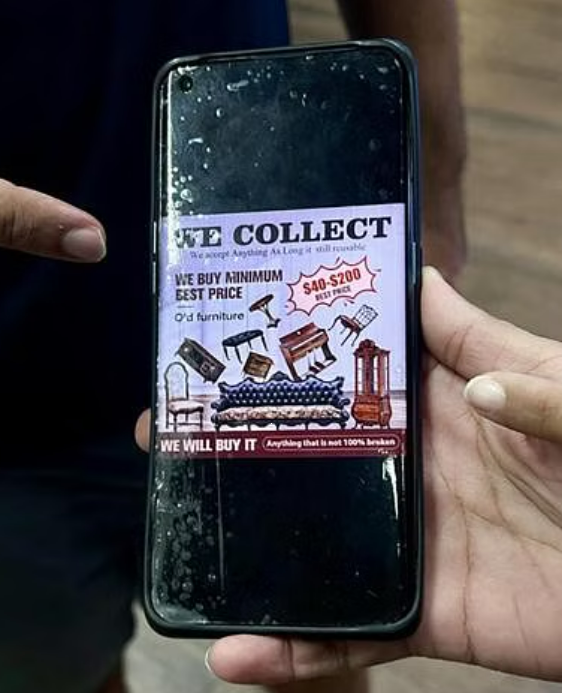Sofa Sale on Facebook Takes a Dark Turn as Scammer Fleeces Seller of $45,000
You: What? Is this another new type of scam?
Indeed it is. We’ve been inundated with reports of various scams, but the ones cropping up these days take deception to a whole new level, perfectly illustrating the essence of “outwitting.”
You: Then why don’t these scammers use their intelligence to earn a degree from Harvard University?
That’s a valid point. Imagine how much better it would be if they channelled their cleverness into more noble pursuits.
Sadly, it seems that even if they possess intelligence, they lack the wisdom to apply it beneficially.
Recently, one such schemer cunningly swindled a simple man trying to sell his sofa, resulting in a staggering loss of $45,000.
The victim, a 35-year-old civil servant named Mr Singh, merely aimed to sell his used sofa.
However, he soon found his phone compromised by insidious malware.

This wasn’t your run-of-the-mill WhatsApp scam malware; this type literally devours your money within minutes.
In early October, Mr Singh stumbled upon a Facebook advertisement promoting the purchase of second-hand items.

He reached out via Facebook to inquire if they were interested in his used sofa, and the conversation soon shifted to WhatsApp.
The scammer sent a link, instructing Mr Singh to open it to verify the delivery receipt number.
The fraudulent advertisement boasted that as long as the items were not completely damaged, the business would accept them, offering a recycling price ranging from $40 to $200.
After some haggling, the next day the party agreed to purchase the sofa for $600 and even made a phone call to discuss further.
During this call, they again sent a link, this time for Mr Singh to open and check the delivery receipt number, which he was supposed to show the driver upon the sofa’s collection.
Later, the scammer falsely informed Mr Singh that the $600 had been deposited into his account, urging him to check his banking app for confirmation.
As he narrated, that evening, the scammer phoned again to finalise the pickup details. It’s remarkable how thoroughly the scammer maintained the ruse.
It was only then that Mr Singh realised his phone was entirely under the scammer’s control.
Looking back, Mr Singh expressed deep regret for not recognising sooner that his phone was remotely controlled.
The scammer exploited Mr Singh’s personal information to open a new account with DBS Bank, elevate the transfer limit, and then proceeded to drain all the funds from both his personal account and the joint account with his wife.
This was done in three separate transactions.
A bank employee suggested he immediately power down his phone and alert the police.
Alas, it was too late to prevent the transfer of over $45,000 from his savings.
Worse still, Mr Singh couldn’t receive any bank alerts since the scammer had total control over his phone, including the ability to delete any two-factor authentication messages before they could be seen.
Under the newly established Shared Responsibility Framework (SRF) for Phishing Scams, compensation might only be possible in cases where fraudsters impersonate legitimate organisations.
Even then, shared responsibility only applies if Mr Singh received no communication from the bank or was unable to contact the bank’s 24/7 reporting channel. More details on this can be found here.
Presently, Mr Singh and his wife are burdened with no savings and must rely on their monthly salaries.
They have numerous financial responsibilities, including car loans, their domestic helper’s salary, and the living expenses for their two children and pets.
The following day, the couple approached DBS Bank again, hopeful for full compensation.
After some discussions, DBS Bank generously offered a goodwill payment, covering half of the scammed amount.
In an interview with Lianhe Zaobao, Mr Singh expressed his bewilderment at how such a large sum could be transferred without proper authorisation.
Both he and his wife hope for full compensation from the bank, as accepting the partial amount feels akin to admitting fault.
DBS responded to these concerns in Lianhe Zaobao, explaining that since the end of September, they have been progressively implementing anti-malware tools in their mobile apps.
These tools are designed to block access if malware or screen sharing is detected on a customer’s device.
This security measure is now fully active across all customer mobile apps.
Regarding the compensation, DBS Bank clarified that they assess such matters on an individual basis. So technically, Mr Singh is lucky on this one.
Meanwhile, the Singapore Police Force is thoroughly investigating this incident.
And FYI: DBS Anti-Scam Hotline:1800-339-6963 or 63396963; or if you head down to the bank, you can straightaway cut the queue to seek assistance.
Alternatively, you can use the “Safety Switch” feature to temporarily freeze your bank funds.




